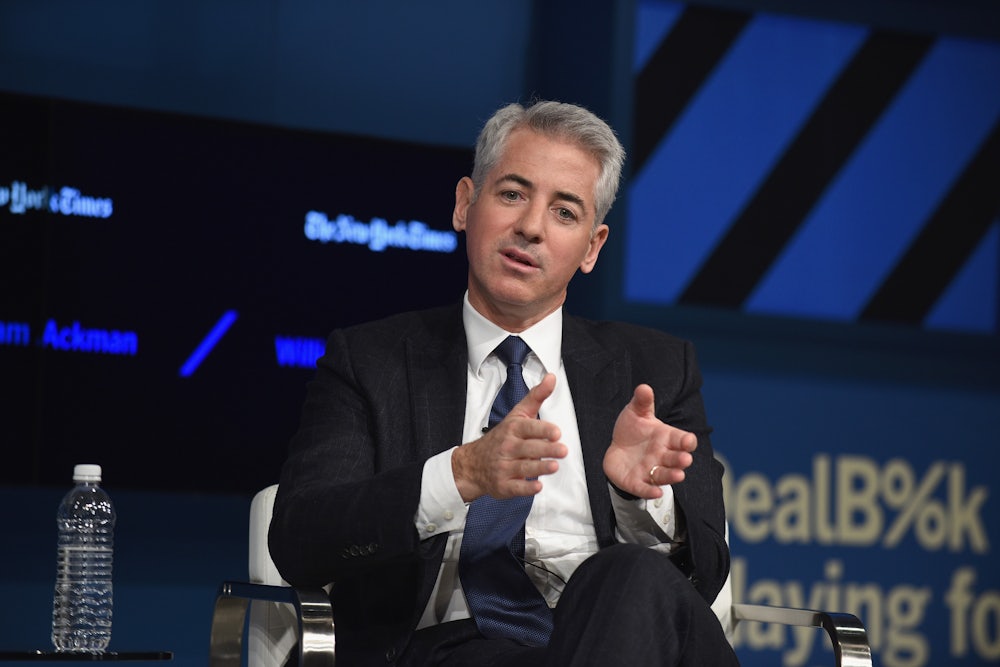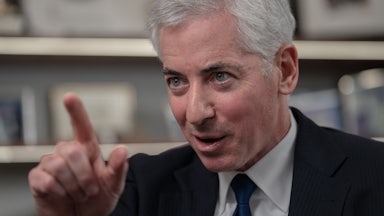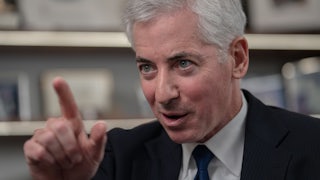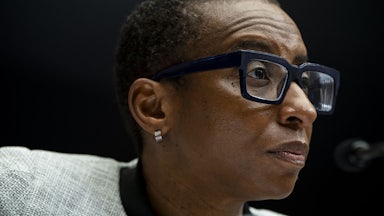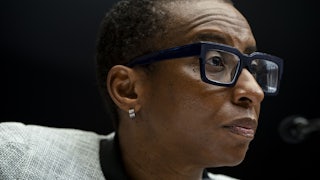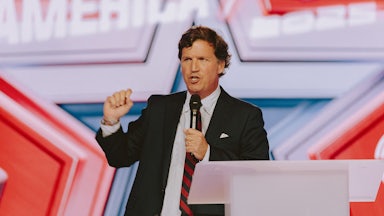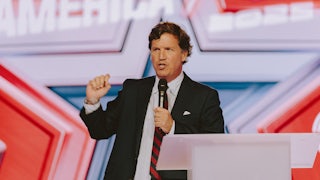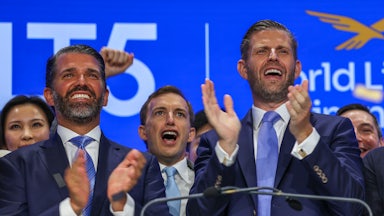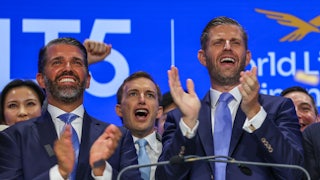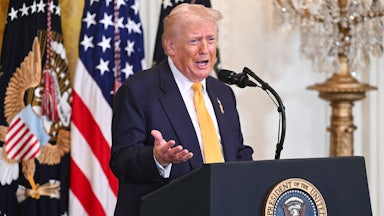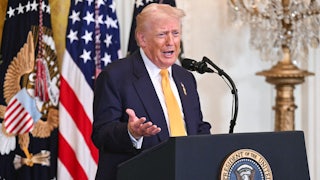Bill Ackman, the hedge fund billionaire who helped chase Claudine Gay out of Harvard’s presidency, learned last week from Business Insider that his wife, former MIT professor Neri Oxman, has a plagiarism problem arguably worse than Gay’s—because in addition to borrowings similar to those that sank Gay, Oxman’s dissertation cribbed from Wikipedia, a source professors typically shoo undergraduates away from. Ackman is not taking this news well.
I’ve written previously about Ackman’s oligarchic bullying and his brazen hypocrisy on the subject of antisemitism. Even as Ackman was trying to blackball a bunch of teenagers whose Harvard student organization signed onto a foolish and offensive letter about the October 7 Hamas massacre, Ackman was simultaneously defending an antisemitic tweet made by 53-year-old Elon Musk, the richest human on Planet Earth (net worth: $241.5 billion). The offending antisemitic tweet was not Musk’s first, and it sent corporate advertisers leaving Twitter/X in droves. In a classic two-step maneuver characteristic of bullies, Ackman punched down and kissed up.
Now Ackman has extended his hypocrisy into the realm of plagiarism, a project that includes bullying Axel Springer, the publisher of Business Insider, into investigating the ethics of its own scoop. His new campaign is more bizarre and potentially more dangerous.
It would be inaccurate to say Ackman took the lead on publicizing plagiarism accusations against Gay; that role was assumed by the New York Post, the Free Beacon, a conservative activist named Christopher Rufo (himself guilty of exaggerating a Harvard credential in his bio), and a still-unidentified person who filed three complaints with the Harvard Corporation between December 11 and January 1. Ackman’s initial beef with Gay concerned student protests over the conflict in Gaza. But Ackman publicized the plagiarism allegations energetically on Twitter well before the most damning evidence appeared, and he made them part of his brief against Gay in his unsuccessful attempt to get her fired in mid-December. As I’ve written earlier, Gay resigned in early January not because Harvard was unwilling to stand up to Ackman about student protests and diversity, equity, and inclusion (which eventually displaced the protests as Ackman’s chief bugbear), but rather because Gay’s plagiarism turned out to be much more serious than initially believed.
After Oxman came under similar fire, Ackman abruptly and seemingly without embarrassment reversed his stance on plagiarism. Here’s what Ackman had to say on January 3, the day that Gay’s resignation was announced:
When the Board finally publicly acknowledged some of Gay’s plagiarism, it characterized the plagiarism as “unintentional” and invented new euphemisms, i.e., “duplicative language” to describe plagiarism, a belittling of academic integrity that has caused grave damage to Harvard’s academic standards and credibility.
I find nothing to quarrel with here. Even granting (as I do) that the initial plagiarism evidence against Gay was embarrassing rather than disqualifying, Harvard administrators’ initial attempt to excuse her “duplicative language” as unintentional was, indeed, absurd. Plagiarists always say they acted unintentionally. (Wouldn’t you?) Perhaps for this reason, the Modern Language Association, which I consider the last word on the subject, makes a point of stipulating that intentionality is irrelevant:
Copying a published or unpublished text of any length, whether deliberately or accidentally [italics mine], is plagiarism if you don’t give credit to the source. Paraphrasing someone’s ideas or arguments or copying someone’s unique wording without giving proper credit is plagiarism.
Similarly, Harvard’s online guide to using sources states:
Plagiarism is defined as the act of either intentionally OR unintentionally [italics mine] submitting work that was written by someone else. If you turn in a paper that was written by someone else, or if you turn in a paper in which you have included material from any source without citing that source, you have plagiarized.
And, yes, it’s still plagiarism if you change a word here or there. Harvard calls that “mosaic plagiarism.” Any student caught plagiarizing, says the online guide, will be “subject to disciplinary action, up to and including requirement to withdraw from the College.”
It’s different, of course, when grown-ups do the plagiarizing at Harvard. When I last looked into this two decades ago, America’s oldest university treated members of its faculty who commit plagiarism much more gently than it did undergraduates. An op-ed published anonymously in The Harvard Crimson a few days before Gay resigned persuaded me this double standard remained in place (until widespread, deeply embarrassing public attention compelled Gay’s departure). Afterward, Ackman, (taking things too far, as usual) wrote on X that Harvard’s allowing Gay to return to her faculty position set a “bad precedent for academic integrity” because “students are forced to withdraw for much less.”
That was January 3. On January 4, Ackman’s views on plagiarism took a 180-degree turn, prompted by Business Insider presenting strong evidence that Mrs. Ackman had committed plagiarism in her doctoral thesis (“including at least one passage directly lifted from other writers without citation”).
It wasn’t fair, Ackman wrote, because “as far [back] as I can remember in business and in media … family was off limits.” Never mind that Neri Oxman is both a grown woman and a public figure. Also, Ackman said, it wasn’t fair because the editor of Business Insider’s investigative group “is a known anti-Zionist” and “my wife is Israeli.” For the record, I find no evidence that this editor, John Cook, is “anti-Zionist.” I suspect Ackman has him confused with a British reporter named Jonathan Cook (who is also not, as far as I know, anti-Zionist).
Also, Ackman wrote, it wasn’t fair because the lead Business Insider reporter, Katherine Long, sent an email to Ackman’s communications aide at 5:19 p.m. Friday, “after sundown on Friday night to a family that celebrates Shabbat dinner together.” The email presented evidence of Oxman’s (again, especially mortifying) plagiarism of Wikipedia and asked for comment. Ackman didn’t state outright that he found a Shabbat email antisemitic, but he noted that Oxman is Israeli and invited readers to “think about that.” I thought about it. Scoops do not arrive on a convenient schedule; it’s imperative to move them quickly before someone else scoops you; and the roughly two hours Business Insider gave Oxman to respond is par for the course.
Ackman also hinted darkly that somebody might have set up Oxman by rephrasing a Wikipedia entry to make it mimic Oxman’s writing (“Wikipedia changes minute by minute”). Ackman hasn’t repeated this argument, possibly because somebody explained to him that Wikipedia records and dates every single change made to its content. (For those of you curious about the ins and outs of Wikipedia editing and the history of the site being plagiarized, Wikipedian and writer Molly White addressed Ackman’s questions in a YouTube video.)
Finally, Ackman said, Oxman received “no due process,” as if journalism adhered to judicial procedures, which it doesn’t.
As for the plagiarism accusation itself, Ackman suddenly found that word to be entirely unacceptable … because Oxman’s plagiarism was not deliberate!
“Plagiarism is fraud,” Ackman tweeted. “Plagiarism is a crime.” Oxman, he wrote,
admitted to making four clerical errors of punctuation and one missed footnote in her 330-page dissertation, and she apologized for doing so. To this day, she has never admitted to plagiarism. She has never committed fraud of any kind.
In a subsequent tweet Ackman argued that MIT, where Oxman received her doctorate, “did not require citation or even mention Wikipedia until 2013, four years after Neri wrote her dissertation.” Mightn’t that be because using Wikipedia as a source for an academic paper was so obviously déclassé that before 2013 MIT couldn’t imagine anyone doing it?
It’s tempting to laugh all this off, but when a transparently hypocritical and utterly misguided complaint about press coverage is attached to $4 billion, which is Ackman’s net worth (according to Forbes), it’s going to make waves. Ackman’s complaint that Business Insider displayed anti-Zionist behavior hit a raw nerve at Axel Springer, a German company whose German employees are required to pledge fealty to Israel. (Yes, that’s overkill. There’s some history behind it.) In a public statement, Axel Springer said it would take “very seriously” allegations “about the motivation and the process leading up to the reporting.” According to Ackman, an Axel Springer director has already told him “I agree with you” that plagiarism is defined too broadly.
Meanwhile, Ackman, convinced that Business Insider obtained the plagiarism evidence on Oxman from someone at MIT, declared a sort of Plagiarisageddon against the university (whose president he was already trying to get fired for her congressional testimony about antisemitism on campus):
Every faculty member knows that once their work is targeted by AI, they will be outed. No body of written work in academia can survive the power of AI searching for missing quotation marks, failures to paraphrase appropriately, and/or the failure to properly credit the work of others.
Never mind that, one month before, Ackman argued that Claudine Gay’s plagiarism demanded attention because it represented an exceptional violation of academic standards. Now Ackman was saying, “They all do it,” and he meant to demonstrate that, not only at MIT but also at Harvard, Yale, Princeton, Stanford, and Dartmouth. Indeed, Ackman argued, “The most productive and important scholars” were the most vulnerable “because the more papers and pages you have written, the greater the probability that you missed a citation or some quotation marks.” By this logic, Harvard shouldn’t have accepted Gay’s resignation as president. It should have given her a raise.
By now Ackman was edging close to an apology about Gay—not, I suspect, out of any sincere remorse but rather because even he was drifting toward some dim recognition that perhaps he was being a little hypocritical about plagiarism. Yes, Ackman tweeted, “I publicly questioned how the board could have approved her remaining on the faculty in light of the amount, nature, and degree of plagiarism that had surfaced in her work.” But “I was convinced by others more expert than I, that her academic oeuvre was not of sufficient scale or quality, and that the plagiarism issue was sufficiently troubling that she was not qualified” even to remain on Harvard’s faculty.
Ackman was misled by academic experts!
In retrospect, I shouldn’t have had to form my own conclusions about plagiarism in her work. That should have been determined in a formal and transparent process by an administrative board comprised of independent members who could have judged her work without personal consequences to themselves.
Never mind that one month earlier Ackman was complaining that, rather than go through channels, the Harvard Corporation went “outside of the proper process” and assigned evaluation of the plagiarism allegations about Gay to “a “three-person panel of ‘political scientist experts’ that to this day remain unnamed” and therefore were free to judge “without personal consequences to themselves.”
On what other Philistines does Ackman threaten, like Samson, to pull down the temple? On Monday, Ackman pledged to “pursue these societally important issues including problems with how our media operates”—reassuring his investors that this vendetta won’t interfere with his day job because “I am posting this while on the elliptical [trainer].” I look forward to my very own plagiarism check. After reading all these tweets I’m tempted to believe that Ackman is in the throes of some very public nervous breakdown, but having seen Donald Trump and Elon Musk behave similarly on social media, I know this is just something rich people do.
